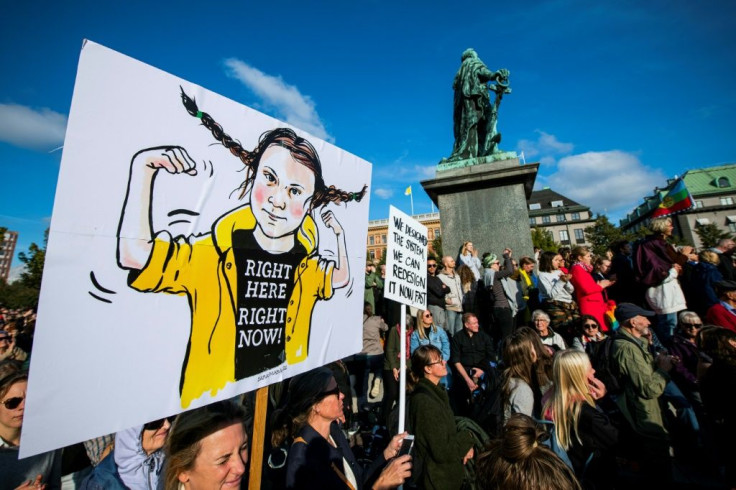Climate Change: Swedes Flying Less As Flight-Shaming Movement Gains Traction

KEY POINTS
- Sweden saw a 4% drop in air travelers in 2019
- Domestic air travel in Sweden fell by 9% year over year
- “Flight shame" in Sweden was popularized by singer Staffan Lingberg
Sweden witnessed a 4% decline in the number of people flying through its airports in 2019 from the prior year, an unusual drop for a major European country.
More than 40 million people transited through the country's 10 airports, down from 42 million in 2018. Domestic travel saw an even steeper decline of 9% year over year.
Scandinavian airline SAS AB said its passenger traffic shrank by 2% last year from 2018.
Sweden’s Klarna Bank AB is even scaling back on business flights and prohibited its employees from air travel within Europe.
Robert Pletzin, a spokesman for Swedavia, the state-owned operator of Swedish airports, attributed the declines to a Swedish aviation tax, fears of an economic slowdown, the weak Swedish krona currency as well as the ongoing debate over climate change.
The concept of "flight shame" arose in Sweden in 2017, when singer Staffan Lingberg vowed to give up flying in order to lower carbon emissions.
Olympic athlete Bjorn Ferry has also championed not flying as has climate activist Greta Thunberg, who has abandoned flying.
More than 22,500 people in Sweden signed a petition to travel on other forms of transportation forms. In fact, Swedish rail travel saw a 17% increase in passengers in 2019 compared to 2018.
“It’s more than a trend, it’s a change in society,” said Stephan Ray, a press officer at SJ, Sweden’s national railway.
The movement is also gaining traction in Germany.
The ADV industry trade group of Germany said the number of people flying between German cities declined by 12% in November 2019 from the prior year, the fourth straight such monthly drop. ADV also predicted a 2.9% drop in takeoffs and landings at German airports in 2020.
Not coincidentally, German railway company Deutsche Bahn reported it is seeing a record number of passengers traveling on its trains.
“To me, this is evidence of heightened awareness of climate change turning to consumer action,” said Stefan Goessling, professor of transport economics at Linnaeus University business school in Sweden.
Alexandre de Juniac, head of the International Air Transport Association, or IATA, warned: “We expect anti-flying sentiment to grow and spread.”
However, outside of Sweden and Germany, other Europeans love the friendly skies.
The European Union reported 1.1 billion passengers in 2018, up from 1 billion the year before. The U.K. alone had more than 272 million passengers in 2018, up from 264 million in 2017.
For the whole world, IATA data revealed that 4.4 billion passengers flew in 2018, a 6.9% jump from 2017.
And worldwide more and more people will be flying in the coming years, especially Asians.
“There is a continuous development of aircraft technology that cannot keep pace with the increase in travel,” said Jonas Akerman, a head researcher in sustainable transportation systems at Stockholm’s Royal Institute of Technology.
Over the next 20 years, the number of passengers is projected to double. In tandem with more crowded skies, by 2050, air travel could account for up to 25% of global carbon emissions.
The most famous Swedish proponent of flight-shame is undoubtedly teenage climate activist Greta Thunberg.
But the aviation industry in Europe has criticized Thunberg and the flight-shaming movement.
De Juniac of IATA said Thunberg and her supporters are unfairly targeting the aviation industry.
“We are not the only polluter on this planet, and we have taken the subject [seriously], directly and massively,” he said.
He warned that the end of air travel would be harmful to society.
“Everybody would stay in his own small village, behind his walls,” he said. “It’s a move backwards, [like reverting to] almost a century ago.”
De Juniac also said he would like to speak personally to Thunberg.
“I would like to tell her that [the strategy] we are targeting is to fly more and pollute less,” he said.
De Juniac, a former chief executive of Air France, further noted that while some airlines are considering the use of sustainable aviation fuels – like, for example, jet fuel made from waste -- to cut emissions, such fuels are still too costly. Also the technology to make large planes powered solely by electricity is at least 15 to 20 years in the future.
“To use electricity [would require] a dramatic breakthrough in batteries,” he said.
© Copyright IBTimes 2025. All rights reserved.





















